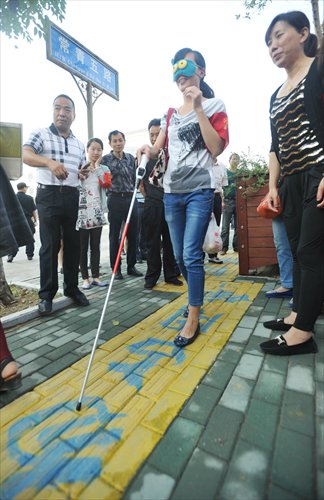HOME >> METRO BEIJING
Fanciful fundraisers
Source:Agencies - Global Times Published: 2014-10-20 18:53:01
Are attention-grabbing charity stunts just for show?

Able-sighted people obscure their vision and use walking canes in order to experience what it is like to be blind for a charity event held in Hubei Province in October 2013. Photo: CFP
Qian Qingqing knows what it's like to go hungry.
As part of an event organized by the China Foundation for Poverty Alleviation (CFPA), she voluntarily went without food for an entire day at the end of last week to raise awareness about how millions of people around the world struggle for the basic necessities of life.
"I realize that poverty and starvation still exist, and how terrible they are," said Qian, a 23-year-old kindergarten teacher. "In the future, I'm going to pay more attention to those in need."
The following day, she designed a special lesson for the students at the preschool where she teaches.
"I asked them what they would do if they had nothing to eat, and told them there were lots of children who were the same age as they who are starving,"said Qian. "It was a way to develop their sense of sympathy towards those who are less fortunate, to teach them to share and to help them realize how precious food is."
Although voluntary fasting events of this kind have been taking place since the 1970s in Commonwealth countries like the UK, Australia and Canada, it was the first time an event of this sort had ever been held in Chinese mainland. According to a Beijing Youth Daily report published on October 16, Sina Weibo posts relating to the event had been read over 53 million times, attracting more than 51,000 comments.
The CFPA's event is just one of a number of publicity-grabbing charity events undertaken in recent years. While such charity stunts have been effective in garnering publicity, they have also come under criticism for deflecting attention from the actual problems they purport to be fundraising for.

A Japanese adult video actress allows a man to grope her breasts as part of Boob Aid, a charity event to raise money for HIV/AIDS patients. Photo: CFP

The CFPA holds China's first voluntary fasting event this year to raise poverty awareness in the country. Photo: IC
Self-starvation misses the point
Although the CFPA's event was successful in attracting publicity, the response was not entirely positive. Some posters on Sina Weibo suggested that those participating were putting their own health at risk by starving, while others queried whether it would be better to let people who are impoverished to experience a day of ample food. Online commentators also noted that although the event promoted awareness of those who live in poverty, nothing was actually being done to alleviate the problem of poverty, in the form of fundraising or donation.
"I think it's something that people are doing for show," wrote one person using the Web name Cai Sanpang on Sina Weibo. "It is the government's duty to provide enough food to poor people, not us, and certainly not by starving ourselves."
In other countries, such events raise money by asking those who participate to seek sponsors, who pledge to give donations in return for the participant's fasting. Chen Hongtao, vice secretary-general of the CFPA, responded to criticisms in a report published in the Beijing Youth Daily on October 17. He dismissed suggestions that fasting for a day was a health risk, so long as the person volunteering was healthy, and kept well-hydrated.
In response to criticisms that the event was not actually raising money for those in need, Chen noted that the publicity raised by the event had led people to donate money to another of the charity's initiatives. Chen said that since the event was announced, 170,000 yuan ($27,771) had been donated to another of CFPA's charity drives, Aijiacan ("Food for love"), which helps to feed children living in poverty in Yunnan Province.
"The discomfort brought on by starvation is a valuable lesson for people to learn," said Chen in the report. "People are more willing to help others if they know what it's like to go hungry themselves. The event encourages people to care more for others."

A man participates in the ice bucket challenge in Beijing to encourage donations for ALS research. Photo: Li Hao/GT
The blind leading the blind
In a small office near Beijing Workers' Stadium, a private not-for-profit initiative called Sun in the Dark offers "blind tours" for the able-sighted. For 120 yuan, paying patrons are blindfolded and led by people who are visually-impaired on short tours of the surrounding streets and cafes, with proceeds going to charity.
Feng Yuquan, a 29-year-old architect based in Beijing, has gone on two such blind tours.
"I read the Three Days to See by Helen Keller [a prolific author and political activist who was the first deaf-blind person to gain a bachelor of arts degree]. There was one line that really left an impression on me: 'Only the deaf appreciate hearing, only the blind realize the manifold blessings that lie in sight,'" said Feng, explaining his interest in blind tours.
Feng's first experience with self-imposed blindness was when he was still a student at Xi'an Technological University. He and two of his classmates decided to blindfold themselves, and to try to walk around in a park near their university.
His sense of sympathy and admiration for people who are visually-impaired increased even more when he did the tour run by Sun in the Dark, which is led by visually-impaired guides.
"When I was walking on the street with eyes covered, I felt completely helpless," said Feng. "Every step forward was so difficult. I was quite afraid of the uncertainty brought by blindness, which an able-sighed person would normally never feel."
"I remember one of the girls who did the blind tour with me was quite funny. Every time she bumped into an object or a person, she would scream," said Feng. "She told the guide that she used to hate those bricks with bumps on them that are paved on the roads as guides for the blind, which sometimes hurt her feet. But after experiencing for herself what it's like to be blind, she said that she would never complain about those bricks again."
Feng does not see the blind tours as a gimmick, but a way for people to gain a greater insight into the life of a blind person.
"Maybe pretending to be blind is kind of weird, but it's way to attract more attention and compassion for people who are vulnerable," said Feng.
Cultivating sympathy
The CFPA's voluntary fasting campaign and Sun in the Dark's blind tours are part of a global trend of using eye-catching stunts that encourage mass participation to draw attention to a cause.
The ice bucket challenge, which involves participants dumping ice water over their heads to encourage donations for amyotrophic lateral sclerosis (ALS) research, has attracted significant media attention in recent months. The challenge was more recently adapted by an anonymous middle-aged man in Thailand, who poured a bucket of excrement over his head and posted the video on YouTube to promote awareness for constipation patients.
In August, Japan played host to a 24-hour charity event called Boob Aid. The event allowed people to fondle the breasts of Japanese adult video actresses for 1,000 yen ($9.34), with proceeds donated to HIV/AIDS charities.
In September, an international viral awareness campaign called "Feeling Nuts" was launched, in which participants are encouraged to post photographs of themselves grabbing their crotches to draw attention to testicular cancer. As with the ice bucket challenge, the campaign has attracted the participation of a number of well-known celebrities, including Hugh Jackman and William Shatner.
Despite some public criticism, charity workers in China are positive about the publicity grabbing stunts.
"People these days are not motivated by donating money or helping to provide the necessities of life for those in need," said Chen Yonghui, vice president of Beijing Ren Ai Charity Foundation. "They need something new and novel, as a vehicle for stimulating interest in the issues faced by groups in need."
Speaking about the CFPA's fasting campaign, Chen said that he considered it to have been a success, albeit indirectly.
"It's made more people aware of the charity, and although the event was a kind of gimmick, I'm confident it will lead people to think about the real problems behind it," said Chen.
Zeng Zhi, one of the co-founders of Peking University-affiliated charity Peace China, expressed similar sentiments in a report that appeared in Beijing Youth Daily earlier this month.
"It did not lead to the public donating huge sums of money, but it was a lighthearted and effective method to address a serious problem," said Zeng. He added that he thought the event would pay dividends in terms of money donated in the long run.
"Although I didn't donate any money to alleviate those who are poor and hungry, I learned a very important lesson from the event," said Qian.
Agencies - Global Times
Posted in: Metro Beijing